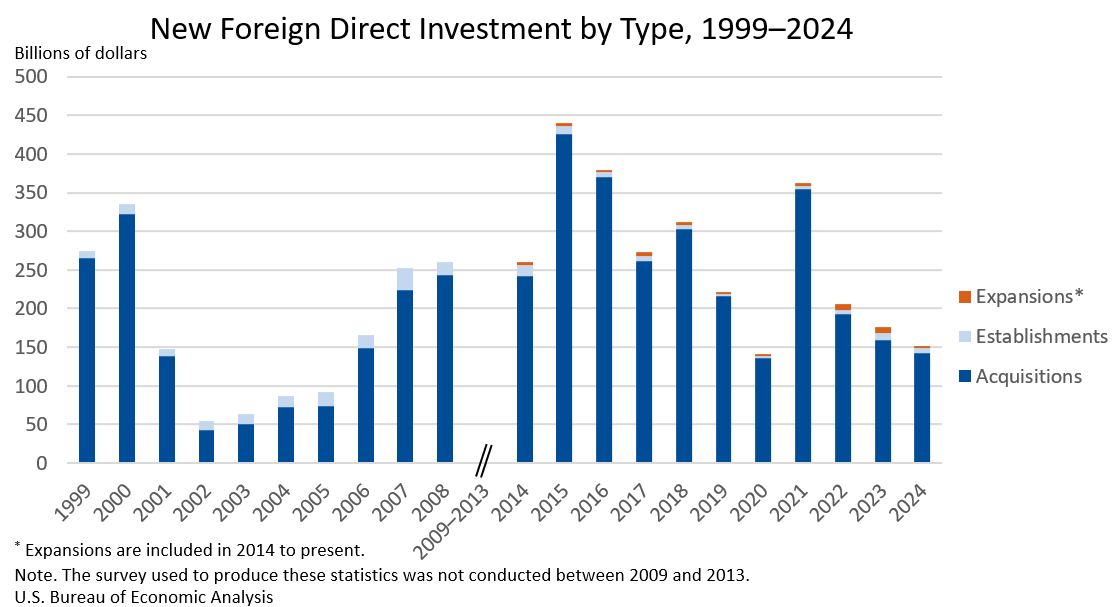Bureau of Economic Analysis
New Foreign Direct Investment in the United States, 2024
Expenditures by foreign direct investors to acquire, establish, or expand U.S. businesses totaled $151.0 billion in 2024, according to preliminary statistics released today by the U.S. Bureau of Economic Analysis. Expenditures decreased $24.9 billion, or 14.2 percent, from $176.0 billion (revised) in 2023 and were below the annual average of $277.2 billion for 2014–2023. As in previous years, acquisitions of existing U.S. businesses accounted for most of the expenditures.
Principal Federal Economic Indicators
Noteworthy
- 2025 News Release Schedule
- Innovation at BEA
- 2025 Annual Updates
- New! Services Trade Data for More Countries
- Data Tool: Trade in Value Added
- Distribution of State Personal Income
- Updated: RIMS II Regional Multipliers
- Arts and Culture
- Space Economy
- FDI Now in State BEARFACTS
- Quick Guide: Price Indexes
The Latest
Gross Domestic Product for the Commonwealth of the Northern Mariana Islands, 2020
Real gross domestic product (GDP) for the Commonwealth of the Northern Mariana Islands (CNMI) decreased 29.7 percent in 2020 after decreasing 11.3 percent in 2019. The decrease in real GDP reflected decreases in exports of goods and services, private fixed investment, personal consumption expenditures, and government spending. Imports, a subtraction item in the calculation of GDP, also decreased.
Gross Domestic Product for the Commonwealth of the Northern Mariana Islands, 2020
Real gross domestic product (GDP) for the Commonwealth of the Northern Mariana Islands decreased 29.7 percent in 2020, after decreasing 11.3 percent in 2019, according to statistics released today by the U.S. Bureau of Economic Analysis.
The decrease in real GDP reflected decreases in exports of goods and services, private fixed investment, personal consumption expenditures, and government spending. Imports, a subtraction item in the…
Personal Income and Outlays, December 2022
Personal income increased $49.5 billion, or 0.2 percent at a monthly rate, while consumer spending decreased $41.6 billion, or 0.2 percent, in December. The increase in personal income primarily reflected increases in compensation and proprietors’ income. The personal saving rate (that is, personal saving as a percentage of disposable personal income) was 3.4 percent in December, compared with 2.9 percent in November.
Personal Income and Outlays, December 2022
Personal income increased $49.5 billion, or 0.2 percent at a monthly rate, while consumer spending decreased $41.6 billion, or 0.2 percent, in December. The increase in personal income primarily reflected increases in compensation and proprietors’ income. The personal saving rate (that is, personal saving as a percentage of disposable personal income) was 3.4 percent in December, compared with 2.9 percent in November.
Gross Domestic Product, Fourth Quarter 2022 and Year 2022 (Advance Estimate)
Real gross domestic product (GDP) increased at an annual rate of 2.9 percent in the fourth quarter of 2022, after increasing 3.2 percent in the third quarter. The increase in the fourth quarter primarily reflected increases in inventory investment and consumer spending that were partly offset by a decrease in housing investment.
Gross Domestic Product, Fourth Quarter and Year 2022 (Advance Estimate)
Real gross domestic product (GDP) increased at an annual rate of 2.9 percent in the fourth quarter of 2022, after increasing 3.2 percent in the third quarter. The increase in the fourth quarter primarily reflected increases in inventory investment and consumer spending that were partly offset by a decrease in housing investment.
Survey of Current Business Begins Rolling Schedule, New Website
BEA’s journal of record, the Survey of Current Business, is starting 2023 by publishing articles more quickly, with a new website that makes content easier to find.
Beginning today, the Survey will publish individual articles, visual essays, statistical tables, and other content when they are ready, instead of holding them to publish together as a single online issue each month.
November 2022 Trade Gap is $61.5 Billion
The U.S. monthly international trade deficit decreased in November 2022 according to the U.S. Bureau of Economic Analysis and the U.S. Census Bureau. The deficit decreased from $77.8 billion in October (revised) to $61.5 billion in November, as imports decreased more than exports. The goods deficit decreased $15.3 billion in November to $84.1 billion. The services surplus increased $1.0 billion in November to $22.5 billion.
U.S. International Trade in Goods and Services, November 2022
The U.S. monthly international trade deficit decreased in November 2022 according to the U.S. Bureau of Economic Analysis and the U.S. Census Bureau. The deficit decreased from $77.8 billion in October (revised) to $61.5 billion in November, as imports decreased more than exports. The goods deficit increased $15.3 billion in November to $84.1 billion. The services surplus increased $1.0 billion in November to $22.5 billion.
U.S. International Investment Position, 3rd Quarter 2022
The U.S. net international investment position, the difference between U.S. residents’ foreign financial assets and liabilities, was -$16.71 trillion at the end of the third quarter of 2022, according to statistics released today by the U.S. Bureau of Economic Analysis. Assets totaled $29.73 trillion, and liabilities were $46.44 trillion. At the end of the second quarter, the net investment position was -$16.29 trillion (revised).




